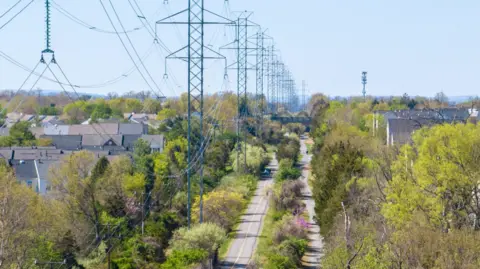The environmental campaigners combating towards knowledge centres
NOV 4 – Environmental campaigner Julie Bolthouse factors out that Northern Virginia has the world’s largest focus of information centres. This is just not one thing she is thrilled about.
“We’re the Wall Street of the data centre industry,” says Ms Bolthouse, who’s a director of native Virginian charity and marketing campaign group Piedmont Environmental Council.
Data centres are huge warehouses that home stacks of computer systems that retailer and course of knowledge utilized by web sites, firms and governments.
Northern Virginia, the northern area of the state of Virginia, has been a key location for knowledge centres for the reason that Nineties. This is because of its fast proximity to Washington DC, but with traditionally low cost electrical energy and land costs.
Centred on the town of Ashburn, which is 35 miles (56km) west of the US capital, there are more than 477 data centres within the state. This is by far the biggest quantity within the US, with Texas in second place on 290, and California third with 283.
In reality, some research say that 70% of the world’s web visitors goes via Ashburn and the encircling space, which has been dubbed “Data Centre Alley”.
Thanks largely to the persevering with increase in synthetic intelligence (AI), which requires extra computing energy, demand for knowledge centres is rocketing. As a outcome, world knowledge centre capability is anticipated to double over the next five years, in accordance with a current research by enterprise evaluation agency Moody’s.
Ms Bolthouse and different environmentalists in Northern Virginia are against the persevering with growth of the information centre sector of their area, saying it’s already having a serious unfavourable impression on their high quality of life.
She factors to new electrical energy cables being constructed over conservation land, parks and neighbourhoods, elevated water demand, and the amenities’ back-up diesel mills affecting air high quality.
Ms Bolthouse additionally cites the truth that households in Virginia and neighbouring Maryland are being anticipated to help pay for the electrical energy community upgrades that the information centres require.
She and fellow campaigners are combating again. “We’re working directly on the ground, opposing each data centre application and working on the local zoning, and trying to educate our local planning commission and supervisors about the issues that we see. But we’re also working at the state level.”
“Our main objections to data centres revolve around their potential negative impacts on our climate, their sustainability, and local infrastructure,” says Tony Lowes of Friends of the Irish Environment. “When data centres rely on fossil fuel, they potentially strain the electricity grid and can undermine national renewable energy commitments.”
The group is continuous to challenge plans for a brand new €1.2bn ($1.3bn; £1bn) knowledge centre in County Clare on Ireland’s west coast.
Mr Lowes provides that whereas Friends of the Irish Environment would favor to see knowledge centre growth halted altogether, there are numerous mitigations which may assist, together with websites prioritising renewable vitality, and implementing vitality and cooling effectivity measures.
 Hugh Kenny
Hugh KennyThe large gamers within the world knowledge centre business try to allay folks’s considerations. This summer time, for instance, Microsoft launched its Data Center Community Pledge.
Microsoft is promising that by subsequent yr it’s going to procure 100% renewable vitality globally. And that by 2030 it’s going to “achieve zero waste through a combination of waste reduction, reuse, recycling and composting”, and change into “water positive”. The latter implies that it goals for its knowledge centres to return extra water to the native provide than they use.
Meanwhile, Amazon Web Services (AWS) already makes use of recycled water for cooling in 20 of its 125 knowledge centres world wide, and likewise says it is going to be “water positive” by 2030.
Josh Levi, president of the Data Center Coalition, which represents dozens of information centre operators together with Amazon Web Services, Google, Microsoft and Meta, says that knowledge centres are main the best way on clear vitality use.
“For example, wind and solar capacity contracted to data centre providers and customers represented two-thirds of the total US corporate renewables market last year, and four of the top five purchasers of renewable energy in the US are companies that operate data centres,” he says.
“The data centre industry is also unlocking greater energy savings and efficiencies for homes, businesses, utilities, and other end users – everything from smart thermostats to grid-enhancing technologies require the digital infrastructure provided by data centres.”
The protests towards knowledge centres have additionally prolonged to South America, the place campaigners say they’ve achieved successes.
In Uruguay, for instance, Google changed the design of a brand new facility now underneath building. It was initially because of be water cooled, however the US big switched to an air-cooled system.
This adopted protests in a rustic that has been experiencing droughts and a scarcity of ingesting water.
“Water use by Google in the initial proposal would have been equivalent to the daily consumption of drinking water by 55,000 people in our country,” says María Selva Ortiz of Friends of the Earth Uruguay.
“This threat to the right to water amidst a water crisis raised strong criticisms, leading Google to change the proposed technology to cool down its equipment, so the project was modified. Chillers will cool down with air instead of water.”
In Chile, in the meantime, Google has halted plans for a knowledge centre over related water use considerations.
Back in Virginia, Ms Bolthouse says the companies have to do extra to spice up sustainability. In the long term, she says, it is going to be within the business’s personal pursuits to enhance knowledge centres’ environmental impression.
“What’s going to happen if we continue with business as usual is that electrical prices are going to skyrocket for everybody, including the data centre industry – and that’s their biggest bill, so that’s going to impact them,” she says. “The water shortage challenge can also be going to impression them.
“So I am optimistic that we’re going to see a little bit of progress, but I think it’s going to take time.”
By BBC


